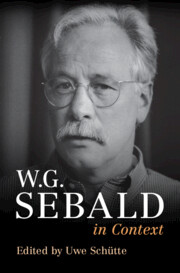Book contents
- W.G. Sebald in Context
- W.G. Sebald in Context
- Copyright page
- Dedication
- Contents
- Illustrations
- Notes on Contributors
- Preface
- Acknowledgements
- Note on Text
- Chronology
- Abbreviations
- Works by W.G. Sebald
- Part I Biographical Aspects
- Part II The Literary Works
- Part III Themes and Influences
- Chapter 17 Critical Writings
- Chapter 18 Minor Writing
- Chapter 19 Franz Kafka
- Chapter 20 Literary Predecessors
- Chapter 21 Walter Benjamin
- Chapter 22 Philosophical Models
- Chapter 23 History
- Chapter 24 Polemics
- Chapter 25 Holocaust
- Chapter 26 Photography
- Chapter 27 Paintings and Ekphrasis
- Chapter 28 Media Theory
- Chapter 29 Travel Writing
- Chapter 30 Ecocriticism and Animal Studies
- Part IV Reception and Legacy
- Further Reading
- Index
Chapter 17 - Critical Writings
from Part III - Themes and Influences
Published online by Cambridge University Press: 24 August 2023
- W.G. Sebald in Context
- W.G. Sebald in Context
- Copyright page
- Dedication
- Contents
- Illustrations
- Notes on Contributors
- Preface
- Acknowledgements
- Note on Text
- Chronology
- Abbreviations
- Works by W.G. Sebald
- Part I Biographical Aspects
- Part II The Literary Works
- Part III Themes and Influences
- Chapter 17 Critical Writings
- Chapter 18 Minor Writing
- Chapter 19 Franz Kafka
- Chapter 20 Literary Predecessors
- Chapter 21 Walter Benjamin
- Chapter 22 Philosophical Models
- Chapter 23 History
- Chapter 24 Polemics
- Chapter 25 Holocaust
- Chapter 26 Photography
- Chapter 27 Paintings and Ekphrasis
- Chapter 28 Media Theory
- Chapter 29 Travel Writing
- Chapter 30 Ecocriticism and Animal Studies
- Part IV Reception and Legacy
- Further Reading
- Index
Summary
A life-long academic, the writer W.G. Sebald kept a critical distance from his discipline of German studies. His scholarly work tested and shaped the poetological premises that determine his literary work. Literary techniques such as intertextuality and bricolage first become the subject of Sebald‘s critical essays before they are applied in his literary works. Themes and motifs decisive for Sebald’s prose texts are also first dealt with in his essays, for example his poetics of coincidence and correlation. Over time, Sebald’s scholarly prose emancipates itself more and more from the conventions of German Studies, developing into a form of essay writing that hardly differs from his narrative prose and thus becomes part of his literary work.
- Type
- Chapter
- Information
- W. G. Sebald in Context , pp. 147 - 155Publisher: Cambridge University PressPrint publication year: 2023

